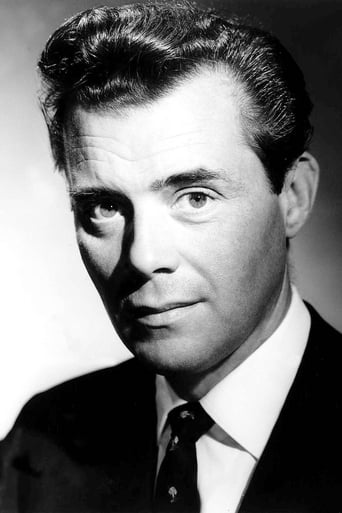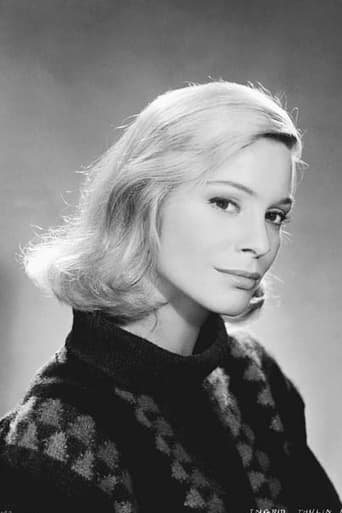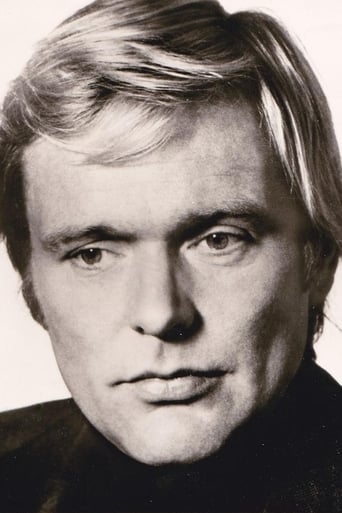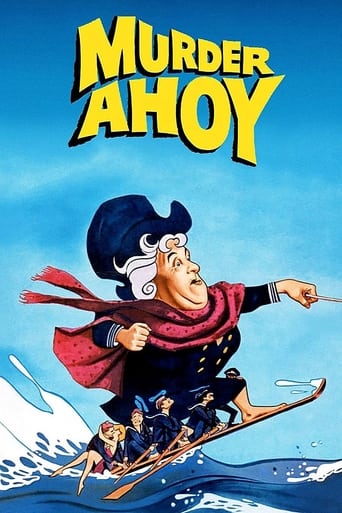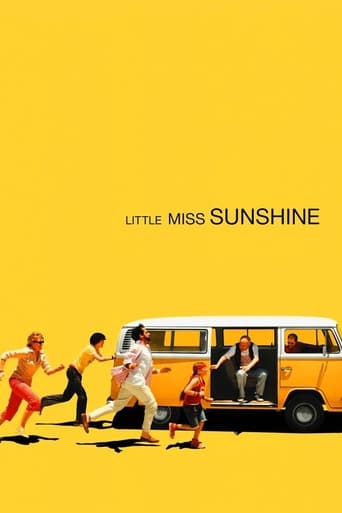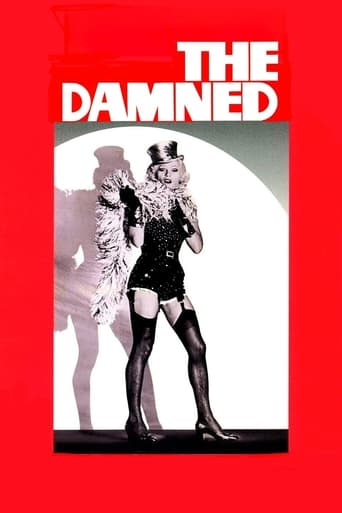
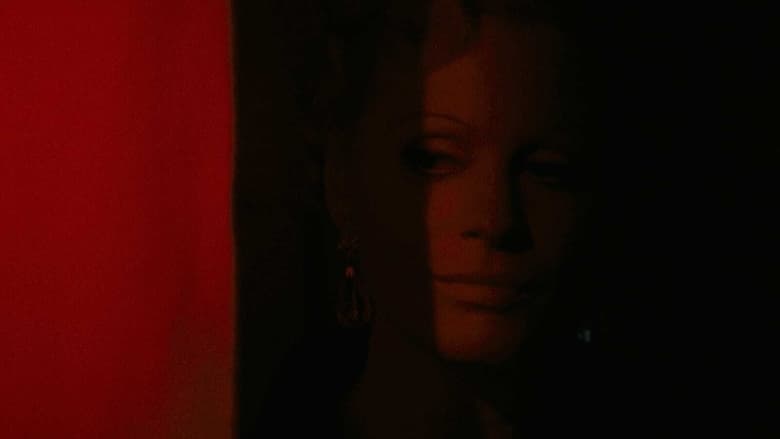
The Damned (1969)
In the early days of Nazi Germany, a powerful noble family must adjust to life under the new dictatorship regime.
Watch Trailer
Cast
Similar titles
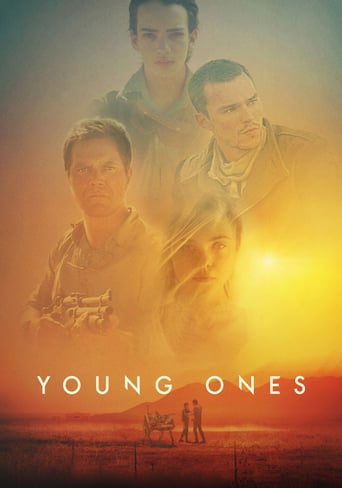


Reviews
Very very predictable, including the post credit scene !!!
Fun premise, good actors, bad writing. This film seemed to have potential at the beginning but it quickly devolves into a trite action film. Ultimately it's very boring.
Good films always raise compelling questions, whether the format is fiction or documentary fact.
The movie turns out to be a little better than the average. Starting from a romantic formula often seen in the cinema, it ends in the most predictable (and somewhat bland) way.
Sorry to go all contrarian here, but I think the story and screenplay (yes, I noticed it got an Oscar nomination, and for that matter that Fassbinder said this film did for cinema what Shakespeare did for the stage) are just wrongheaded, whether you consider the film as a family melodrama or as some sort of historical allegory about Nazism or a philosophical parable. The actors do their best with it, and the visual imagery is skillfully done, but they can't make a good movie out of this piece of cloth. Really, I think this.(This review is based on the US English-dubbed DVD, so it's conceivable that I'm missing something that was in the original. But I'd have to be shown.)Let me get it out of the way first that this film appears to me to be really a bad portrayal of LGBT people, beginning with the famous drag scene acted by Helmut Berger -- which in this film warns the viewer to watch out for Martin Essenbeck, because any man perverted enough to dress up as Marlene Dietrich is perverted enough for any crime, without distinction of age, gender, or relationship -- and leading on to the rather fanciful reimagination of the Night of the Long Knives with rooms full of naked young men getting shot down. Yes, I KNOW that Visconti was gay himself and that Berger is bi, so maybe I, a straight amateur, have no right to criticize here. Maybe this is some sort of satirical subversive reappropriation of the view that gays were to blame for the Third Reich (which you can hear from some voices on the right wing today). I cringed, but I am leaving this factor out of consideration in my rating.Let's start, then, with the allegory idea. Blurbs here and there say that this film is an allegory of the rise and fall of Nazism, but it isn't. The action starts a month after Hitler's swearing-in, on February 27, 1933, the night of the Reichstag fire, and it closes not too long after the SA purge on June 30, 1934. This is a period in which Nazism consolidated its victory, after its rise; its fall was not even on the horizon yet, and that's true in the film as well.For an allegory to work, it requires some kind of knowledgeable approach to the subject matter and some kind of apparent argument to make, picture to portray, or other reason to exist. There is supposed to be some kind of correspondence between the characters in the allegory and whatever concepts or entities they are supposed to represent. How does that work in "The Damned"? To begin with, the context of Nazism is shut completely out of the movie. You hear nothing about the depression; the Communists are mentioned in a word and then dropped. You hardly even see the steel works. The whole enterprise is just a MacGuffin, something for everyone to fight over. We are shown a family with several different approaches to the Nazi victory of 1933. Joachim, the patriarch, is willing to make a grudging compromise; Konstantin, the son, is a thuggish SA man (a rich baron would have cut an odd figure as an SA leader, but I digress); Sophie, the widowed daughter-in-law, and Friedrich, the works manager and her lover, want to use the Nazis for their own power; Herbert, the son-in-law, resists in words. Aschenbach, the Mephistophelean SS man, plays with them all, and none of the above family members are entirely successful; scum is rising to the top, and it's hard to be the kind of absolutely depraved scum that Aschenbach is looking for. The idea that it would be useful, even to the Nazis, for the manager of a steel works to know something, about, you know, management or steel - this doesn't arise.If there is an allegory here, it is not a very useful one. It's not about how the Nazis rose (or fell). It doesn't account for Aschenbach. He can have come from Hell or outer space, as far as we know. It doesn't say what if anything to do about Nazis either. It's about who (within this tiny sliver of the privileged) ends up winning the competition organized by Aschenbach to prove oneself most reliable by being the most depraved and the closest to a mathematical human zero.And all it tells us is that Nazism was a bad thing - watch out for it. True enough, but I don't think it's particularly enlightening about it otherwise.The film works even less well as a melodrama. The screenplay requires the actors to bellow and snarl lines at each other about their feelings and intentions which are worthy of telenovelas, but it has none of the virtues of a telenovela screenplay. It has no sympathetic or compelling central characters. The central characters are all horrible, and the non-horrible ones are all peripheral. There are no coherent plans that any of them are pursuing that get anywhere. Ashenbach doesn't count, as he has no personal life and is more of a force field than a character.The best gloss I can put on this is that it is really an existential parable, which is not really about Nazism at all, but about Evil, which if you save your soul it kills you, or if you try to sell it your soul it cheats you and kills you anyway; the only way to survive is to have no soul in the first place. But then there you are with no soul. It's a bleak world-view and not terribly adaptive, but the movie has a right to it, I guess. But I think Nazism was just too horrible and real a thing to be used as just a prop in this kind of exercise.
Luchino Visconti's film, "The Damned," is perhaps disturbing and brilliant all at once. Visconti, the director, set to make a film about the German Nazis and a fictional family, the Von Essenbechs, who are wealthy and prominent. There are some very disturbing moments in the film especially with Martin's character, At first, I thought he was a closet homosexual but he really is pedophile and his crime against his mother is unforgivable much less unforgettable. I won't spoil that scene for you but be warned, it's disturbing. Martin comes across as a deeply troubled man and he is in the role. Ingrid Thulin and Charlotte Rampling play mothers and wives in this Shakespearean style tragedy reminiscent of Macbeth and Hamlet. Thulin and Rampling are both brilliant in their roles. Sir Dirk Bogarde is believable as a German Frederick. The family's weaknesses are preyed upon by an outsider who sets them up to self-destruction. We know what happens to Germany after the film ends and that is the horror of what happen to Europe as well. Seeing Martin transform into a powerful Nazi from the beginning is unpredictable without manipulation. The violence and sexual debauchery is also unforgettable as well.
Luchino Visconti's The Damned is a difficult film to qualify. The Italian title (roughly translated as The Fall of the Gods) makes one think of Wagner's opera. The story, a family drama full of back-stabbing and reciprocal hatred, evokes the great Greek tragedies. And the sensationalist marriage of Nazism and every imaginable form of human perversion earns it a spot in the infamous Nazisploitation genre, although of a more refined brand than Ilsa, She Wolf of the SS.The film follows the decline and fall of the Essenbecks, a rich family whose steelworks has strategic importance to the Third Reich. The film opens like The Godfather, during a family celebration, the birthday of old Baron Joachim, the patriarch. Unlike in Coppola's film, however, here there are no strong ties, only recriminations and intrigues.The Baron is old and several factions want to take control of the steelworks: Frederick (Dirk Bogarde) is backed by SS officer Aschenbach (Helmut Griem); Konstantin (Reinhard Kolldehoff), an SA officer, wants the factory to empower the position of the SA in the Third Reich; and Herbert (Umberto Orsini), the current vice-president, wants to keep the factory out of Nazi hands.There's also Martin (Helmut Berger), the actual heir, a decadent, hedonist pervert who, in an amazing drag performance, during the festivities re-enacts Marlene Dietrich's cabaret scenes from The Blue Angel. Martin is the wild card in this power struggle; he cares nothing about business so long as he can continue to live his wild life of dissipation in a secret apartment with his lover (Florinda Bolkan in a sexy short role). However controls him controls the steelworks.Two events conspire against Herbert, one of the few voices to rise against the coming barbarities. First the Reichstag building burns down that same night, symbolically announcing the end of democracy in Germany and prompting the Baron to place the steelworks in the hands of Konstantin, a man closer to the powers that be, for the good of the factory. And secondly, the murder of the Baron, never shown on screen but probably committed by Frederick himself and blamed on Herbert, who quickly flees the country. Frederick, eager to get to the top, had been warned all night by Aschenbach that something was going to happen and that he must prove his devotion. With the Baron dead, Martin, involved with his mother (Ingrid Thulin) in an overtly incestuous relationship, hands over the power to her lover, Frederick.It may seem like I'm describing a lot, but this amounts to the first half hour. If this long film were a novel, it could only be a 19th century naturalist novel, full of characters and byzantine plots that confuse the inattentive reader. The first minutes begin with several parallel conversations, so close attention is required.Once Frederick is in power the real power struggle with Konstantin begins. The film doesn't just show a family conflict but a political conflict within the Third Reich, between the SS and the SA, the Nazi Party's paramilitary faction. If Konstantin's power rose, the Essenbeck steelworks would allow them to arm themselves and become too independent. This conflict historically ends with the Night of the Long Knives, a purge that led to the execution of many SA officers, and which Visconti recreates in an epic, bloody sequence that resonates through The Godfather's final massacre.Although this film may seem like a convoluted mess at times, my interest never wavered. The characters are so insidious and their evil so seductive, not to mention that the actors playing them are uniformly good, that this film is a delight for those who like to visit once in a while the darkest side of men. Dirk Bogarde, Helmut Griem, Helmut Berger and Ingrid Thulin shine in every opportunity. Berger and Griem deserve special credit. Griem's amoral Aschenbach, the embodiment of the new society of supermen to whom everything is permissible, steals every scene he's in with the serenity and good humour that accompanies his little speeches about Nazi philosophy. At one point Martin is arrested because a little Jewish girl he molested hanged herself. Aschenbach, using a fatherly tone, assuages Martin's fears by explaining that since she was Jewish it isn't even a crime anymore. Once in a while a film reminds us why Nazis will always be cinema's greatest villains.Although I can't say that this ensemble film has a main character, Martin is the one who changes the most, from a weak, effeminate crybaby to the family's ruthless patriarch, similar to Michael Corleone, to pursue the comparison with Coppola's film. But whereas Michael is a self-made man who takes power into his own hands through cunningness, Martin remains a slave when Aschenbach shifts his alliance to him and abandons the social-climber Frederick. Martin is an actor's dream role, a character who himself plays a role, that of a powerful man. Or at least tries to play it. Berger's triumph is that he always portrays Martin as self-doubting tyrant unsure of his own power. His façade is full of cracks. And like a naughty child who's got his back covered by a doting father, his revenge is as petty as it is exaggerated.The Damned may seem, to those who keep their imagination in bondage, a dated film. Audiences nowadays demand Nazis with human faces, like in The Pianist and Downfall. Visconti's Nazis belong to their age. But like Colonel Hans Landa, they're infinitely more entertaining. All in all, the film's themes of moral decline and complicity during the Third Reich come through in a clear if oversimplified manner. But the Essenbeck, so diverse in their perversions – incest, murder, pedophilia – and so absolute in their hatred, are so fascinating they'll never lose an iota of their sensationalist charm.
At the time of its release this one must have been a pure shocker. Once it gets going the depravity portrayed on scene is astounding and that was probably Visconti's intention. Portraying Nazi Germany as morally bankrupt was not such a far stretch after all. But today such depictions are commonplace and in fact pale in comparison to much that is displayed even on TV let alone movie theaters. Still, there's enough there to keep one's attention and wonder what comes next.The problem with this movie is its length. In my humble opinion it would have been more effective to shorten many if not all of the scenes. Visconti does have a tendency to drag things out anyway but in "The Damned" this becomes almost obsessive. The scenes drag on and on and I found myself distracted and wanting to shout "we got the point, get on with it already". There were also a couple of times when I thought the film had ended only to be disillusioned.I suspect that many viewers felt similarly at the time of its release. They may have stayed with it purely for its shock value or because they didn't have the luxury of screening movies at home but my criticisms were as valid then as they are now.
